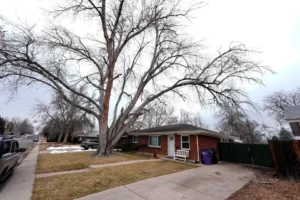Funding Cuts Impact Juvenile Justice in Wyoming
14 counties forced to cut staff and programs at community level
- Published In: Criminal Justice
- Last Updated: Jan 06, 2022

Funding cuts to the Department of Family Services budget will deteriorate the already struggling juvenile justice system in Wyoming and really be felt later in 2022, says Narina Nunez, a professor of psychology and law at the University of Wyoming. She also serves on the State Advisory Council on Juvenile Justice. (Photo by Christine Kronz for the Wyoming Truth)
By Walter Ko
Special to the Wyoming Truth
More juveniles in Wyoming may be sent to prison or remain incarcerated after cuts made to the Department of Family Services budget have halted many locally-run diversion programs for juveniles, according to activists and experts.
The Department of Family Services gave $579,783 in 2021-2022 funding to 14 Wyoming counties for their individual Community Juvenile Services Boards (CJSBs) to identify juveniles at risk and operate diversion programs to prevent juvenile delinquency.
But with Wyoming Gov. Mark Gordon’s call to drastically cut state funding to meet an “epic decline in revenue,” juvenile boards in these counties lost this funding July 1. It means they had to reduce staffing, eliminate key programs and not extend contracts with the private sector. And it comes at a time when Wyoming has one of the highest per capita rates in the nation for incarcerating juveniles.
The budget cut went into effect with passage of a state bill later in 2021, which added a clause, “subject to the availability of funds,” that took away Department of Family Services funding for the juvenile boards.
“The statutory authority creating the Community Juvenile Services Boards will remain in place,” says a department document on the budget cuts titled “2021-2022 Step Two COVID 19 Reductions. “Funding through the Department of Family Services will no longer be available.”
Another Department of Family Services document on the budget cuts outlines the impact on each of the 14 counties’ Community Juvenile Services Boards, including job losses and the suspension of programs aimed at preventing juvenile delinquency.
In Teton County, the funding, now lost, was used to cover administrative fees and travel costs for its diversion program while hiring a therapist to run care programs in the community. That therapist is no longer there.
Sweetwater County was using its share of funding to keep one full-time youth case manager to provide services for its pre-court diversion program, but that staff position is gone. Campbell County had directed its funds to continue providing shelters for youth at risk and provide supportive services for the housed individuals, but those services have been halted.
The State Advisory Council on Juvenile Justice, an advisory panel for the governor’s office, has called for the funding to be restored quickly.
Members of the council say an expected increase in juvenile incarceration, even though numbers do not support their forecast at the moment, will inevitably cost Wyoming more in the future, as juveniles with criminal records will be deprived of employment, education and social opportunities to stay out of prison.
The programs that the juvenile boards have run helped lower individual counties’ recidivism rate for juveniles, they say, adding that reaching adolescents before they commit more serious crimes is crucial to keeping them in school.
“It’s very hard to keep track of what exactly is going on because of this pandemic; everything is going crazy,” Dr. Narina Nunez, a professor of psychology and law at the University of Wyoming who serves as a member of the state advisory council, said to the Wyoming Truth.
Nunez said uncertainties remain as to how much impact the budget cuts will bring for the time being, emphasizing that “fruits” of 2021-2022 will be seen probably later this year, as Wyoming counties “just recently had to stop their programs.”
Nunez added that cuts to the Department of Family Services budget will deteriorate the already struggling juvenile justice system in Wyoming.
Juvenile boards are allowed to search for their own funding by applying for grants or earning support from the private sector as state funding is no longer available, Nunez said, but they “have not been so successful” despite some help from state advisory council members who are also involved in the juvenile boards for the 14 counties.
The advisory council in June submitted a proposal to the governor to use some of the funds given to Wyoming as part of the American Rescue Plan Act of 2021 to bring back funding to the juvenile boards for three years. The federal act was presented as a stimulus package for states to recover funding for their programs lost from declining tax revenues amid the COVID-19 pandemic.
The State Advisory Council on Juvenile Justice did not hear back on its proposal at its most recent meeting on Nov. 18.
Some advisory council members have asked that the state participate again in the Juvenile Justice & Delinquency Prevention Act, which created a program setting minimum rules to protect children and assures some funding from the federal government for individual states to improve their juvenile justice systems.
Wyoming dropped out of the program in 1992 and is one of four states, along with Connecticut, Nebraska and Texas, that voluntarily do not comply with the act and thereby miss out on receiving the grant.
The states have failed to comply with federal standards about finding alternatives for juveniles other than being placed in detention centers for offenses such as truancy and running away as well as having juveniles segregated from adults in their judicial and correctional proceedings.













